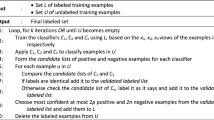Abstract
The edition process is an important task in supervised classification because it helps to reduce the size of the training sample. On the other hand, Instance-Based classifiers store all the training set indiscriminately, which in almost all times, contains useless or harmful objects, for the classification process. Therefore it is important to delete unnecessary objects to increase both classification speed and accuracy. In this paper, we propose an edition method based on sequential search and we present an empirical comparison between it and some other decremental edition methods.
This work was financially supported by CONACyT (Mexico) through the project J38707-A.
Preview
Unable to display preview. Download preview PDF.
Similar content being viewed by others
References
Randall, W.D., Martínez, T.R.: Reduction Techniques for Instance-Based Learning Algorithms. Machine Learning 38, 257–286 (2000)
Gates, G.W.: The Reduced Nearest Neighbor Rule. IEEE Transactions on Information Theory 18(3), 431–433 (1972)
Wilson, D.L.: Asymptotic Properties of Nearest Neighbor Rules Using Edited Data. IEEE Transactions on Systems, Man, and Cybernetics 2(3), 408–421 (1972)
Blake, C., Keogh, E., Merz, C.J.: UCI repository of machine learning databases. Department of Information and Computer Science. University of California, Irvine (1998), http://www.ics.uci.edu/~mlearn/MLRepository.html
Author information
Authors and Affiliations
Editor information
Editors and Affiliations
Rights and permissions
Copyright information
© 2005 Springer-Verlag Berlin Heidelberg
About this paper
Cite this paper
Olvera-López, J.A., Carrasco-Ochoa, J.A., Martínez-Trinidad, J.F. (2005). Sequential Search for Decremental Edition. In: Gallagher, M., Hogan, J.P., Maire, F. (eds) Intelligent Data Engineering and Automated Learning - IDEAL 2005. IDEAL 2005. Lecture Notes in Computer Science, vol 3578. Springer, Berlin, Heidelberg. https://doi.org/10.1007/11508069_37
Download citation
DOI: https://doi.org/10.1007/11508069_37
Publisher Name: Springer, Berlin, Heidelberg
Print ISBN: 978-3-540-26972-4
Online ISBN: 978-3-540-31693-0
eBook Packages: Computer ScienceComputer Science (R0)




